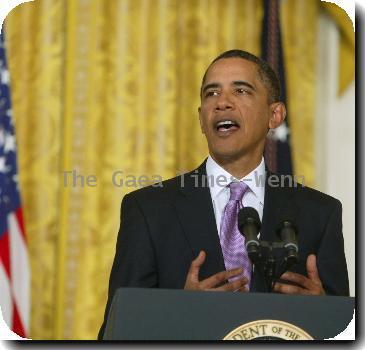Obama team hit with tough questioning as it promotes Obama budget on Hill
By Tom Raum, APTuesday, February 2, 2010
Obama team draws sharp Hill questions on budget
WASHINGTON — Top administration officials tried to steer President Barack Obama’s new $3.8 trillion budget through a congressional minefield on Tuesday as the day-old plan drew fire from Republicans and Democrats alike.
In the first test of the spending blueprint on Capitol Hill, Democrats took shots at the budget’s proposed hits on some favored programs, including cancellation of the U.S. mission to return to the moon and a spending freeze on Army Corps of Engineers projects.
Republicans generally contended it didn’t go far enough to trim deficits while increasing taxes too much.
New Hampshire Sen. Judd Gregg, the top Republican on the Senate Budget Committee, said Obama’s promise to freeze some domestic spending for three years was more symbolism than substance. “Sure, it’s the right sentiment but it doesn’t get you anywhere,” Gregg said. “It’s small ball. It’s not even a bunt.”
However, in one sign of possible common ground, Senate Finance Committee Chairman Max Baucus, D-Mont., suggested there is budding bipartisan support for Obama’s proposal to give companies a $5,000 tax credit for each new worker they hire in 2010.
“We need to work on legislation that will create jobs,” Baucus said. “And we need to work across the aisle, so that the legislation on which we work can become law.”
That sentiment was echoed by Treasury Secretary Timothy Geithner, who told the Finance Committee he sees a consensus building among both Democrats and Republicans that “deficits matter, tax cuts are not free.”
“The American people want to see their leaders coming together and bringing practical solutions” to the problems created by the worst economic downturn since the 1930s, Geithner said.
Even so, Obama probably won’t be able to count on support for his jobs bill from one Republican senator who has worked with Democrats in the past.
Sen. Olympia Snowe, R-Maine, blasted the idea for the $5,000 tax credit, saying businesses won’t hire workers until they need them. “Who is going to take the risk?” she asked.
For the most part, Obama’s team found itself more often on the defensive as it sought to promote the day-old budget for the fiscal year that begins next Oct. 1. The expressions of skepticism and complaints across party lines showed how difficult it will be for Obama to win election-year support for his new spending plan, even from members of his own party.
A key topic of controversy at Tuesday’s hearings: Obama’s proposal to use $30 billion in funds from the bank bailout program, the Toxic Assets Relief Program, for small businesses. The proposal, which Obama was outlining at an appearance in Nashua, N.H., would use some remaining TARP money to invest in community banks to encourage them to lend to small businesses.
Gregg argued that TARP money repaid by banks is by law supposed to go toward paying down federal debt. “It’s not for a piggy bank because you’re concerned about lending to small businesses,” Gregg told White House Budget Director Peter Orszag.
Orszag told Gregg the administration was well aware of the provision in the TARP legislation requiring money to be paid back and anything extra used to pay down the national debt. That’s why the administration is seeking legislation to authorize the $30 billion program, Orszag said.
But separately, Sen. Maria Cantwell, D-Wash., told Geithner the administration shouldn’t wait for legislation to OK such loans, it should just extend the money — as it had done in using TARP funds to help bail out automakers and big Wall Street banks.
The government “put the screws to the community banks and gave all the money to the big banks. Right now people are cutting lines of credit to small business,” Cantwell complained.
The administration has proposed a $90 billion tax on big banks over ten years to help recoup losses from the TARP program. Geithner told the Senate Finance Committee the U.S. might have to extend such a tax — the administration calls it a “fee” — beyond the ten years if the U.S. hasn’t recouped the cost of the financial rescue by then.
The Democratic chairman of the Budget Committee, Sen. Kent Conrad of North Dakota faulted the administration for not doing enough to stanch the deficit flood. Conrad said the administration doesn’t do nearly enough to address out-of-control deficits in the next few years.
“I don’t see the focus on bringing down that long-term debt,” Conrad said. Years of deficit spending, aggravated by the recession and two wars, have swollen the national debt to a whopping $12.1 trillion.
Sen. Patty Murray, D-Wash., challenged the administration’s proposal to include Army Corps of Engineers public works projects in its three-year spending freeze. And Sen. Bill Nelson, D-Fla., railed about the decision to eliminate NASA’s program, initiated by former President George W. Bush, to send astronauts back to the moon.
Administration officials went before three separate Senate Committees — Budget, Finance and Armed Services — to defend and promote the new budget.
Defense Secretary Robert Gates told the Senate Armed Services Committee the $768.2 billion defense part of the budget would help pay for “a broad portfolio of military capabilities” as it fights wars in Afghanistan and Iraq.
Gates also said the spending would also help the United States “prepare for a much broader range of security capabilities” for the future.
Adm. Mike Mullen, chairman of the Joint Chiefs of Staff, told the panel that the war in Afghanistan is now the Pentagon’s top priority. “The Afghan people are the center of gravity and defeat of al-Qaida the primary goal,” he said.
__
Associated Press writer Andrew Taylor contributed to this report.
(This version CORRECTS date on jobs tax credit to 2010, rather than 2020.)
Tags: Astronomy, Barack Obama, Geography, Government Regulations, Industry Regulation, North America, Personnel, The Moon, United States, Washington


